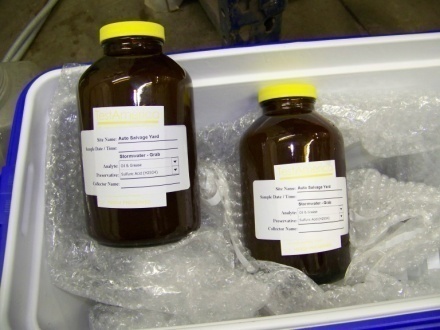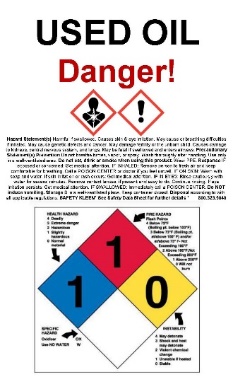The Certified Automotive Recyclers program was established by the industry to set a standard of excellence in compliance for automotive recycling.
The certification program has established standards that participating member yards meet specific to general business practices, environmental compliance and stewardship, occupational health and safety practices and licensing and regulatory requirements. Together the criteria provide a basic framework of expectations by which member auto recyclers are certified.
Certification distinguishes members of the auto recycling community as professional recyclers adhering to the highest standards of excellence in the industry. The certification process is an on-site audit and documentation of the practices at individual salvage yards.
ARA CAR Program
The Automotive Recyclers Association (ARA) Certified Automotive Recycler (CAR) program has a suite of guidance documents that can be used by members and non-members alike to attain compliance with regulatory rules in both safety and environmental aspects. CAR program standards are based on the laws that govern auto recycling businesses.
https://aracertification.com
The certification website is both a guideline to certification and a tool to be used navigate the CAR program and the specific standards as well as the Gold Seal program for quality assurance and other levels of certification such as High Voltage Vehicle and Recall Certification.
http://www.ecarcenter.org/FactSheets.html
The industry compliance assistance website is available for state-by-state information to attain and maintain the level of regulatory compliance in environmental management practices befitting a professional recycler.
Professional Recycler Business Standards
A professional auto recycler seeking certification as such must be licensed, permitted and in compliance with regulations of the federal, state and local jurisdictions.
Tracking productivity indicators helps target applicable regulations.
• Average number of salvaged vehicles processed for parts monthly.
• Number of dismantling bays at facility.
• Average number of employees at the facility.
The average number of vehicles processed in a month is an important productivity indicator because it will indicate the volume of fluid storage required, disposal issues to manage and regulatory level based on hazardous waste generation rate and on-site storage capacity.
The number of employees at the facility will have some bearing on OSHA reporting requirements.
CAR standards include
General Business Standards
Environmental Standards
Every business must determine whether its waste is hazardous or non-hazardous. Automotive salvage yards have many wastes that are potentially hazardous. Most of these wastes are exempt from hazardous waste management to encourage recycling. Determination is not necessary for these wastes, if recycled.
These wastes are exempt from hazardous waste management, if recycled:
• Used Oil including Brake, Transmission & Hydraulic Fluids
• Spent Lead-Acid Batteries
• Fluorescent Bulbs
• Mercury Switches
• Refrigerant
Fluid Evacuation, Storage & Disposal Standards
Facilities with oil storage capacity of 1320 gallons or more are required to prepare and implement a Spill Prevention Control and Countermeasures (SPCC) plan to ensure that the appropriate measures have been taken to reduce the risk of oil reaching navigable waters in the event of spill. Not so recent changes to the SPCC rules allow facilities with less than 10,000 gallons of on-site storage capacity to self-prepare a written spill prevention plan. The new rules are less stringent but have also created a sense of urgency.
Solid/Hazardous Waste Removal, Storage & Recycling Standards
Core & Vehicle Storage & Crusher Areas Standards
Parts Cleaning Standards
Parts cleaning is one of the bigger environmental issues to manage. Washing must never be conducted outdoors with surface discharge as that is a violation of the storm water regulations. Wash water disposal options depend on whether the facility is connected to the city sewer or on a septic tank system. Direct discharge to the city sewer is allowable in most jurisdictions. Septic discharge of wastewater is not allowed. Only hand washing sink or toilet water can be discharged to a septic tank. The one exception is that mop water can also be poured down the drain or flushed in the toilet that discharges to a septic system. All other commercially generated wastewater must be managed in a closed loop system, taken away by a sump sludge hauler or hauled to town for disposal.
Storm Water Permitting Standards 
Stormwater regulation are the most perplexing regulatory issue for auto recycling and the most probable reason a facility will receive a regulatory visit from the state agency or US EPA. Generally speaking, your auto recycling facility NEEDS a STORMWATER PERMIT. The state have different rules but most are very similar including keeping a valid permit by paying a fee and developing a Storm Water Pollution Prevention Plan (SWPPP) where you log quarterly inspections and annual training. Most states also have sampling requirements. State specific information and links can be found at http://www.ecarcenter.org/FactSheets.html.
Safety Standards
Hazard Communication Program Standards
A Hazard Communication Program or “safety program” in compliance with the Haz Comm and GHS rules in which an individual is in charge of regularly scheduled safety meetings, training and inspections.
• Written Haz Comm Plan
• Safety Data Sheets or SDS for each chemical in workplace
• GHS Labels on containers
• Safety Training for employees is logged
• Safety Supervisor
The Hazard Communication Standard (HCS) is based on a simple concept - that employees have both a need and a right to know the hazards and identities of the chemicals they are exposed to when working. They also need to know what protective measures are available to prevent adverse effects from occurring. Under the provisions of the Hazard Communication Standard, employers are responsible for informing employees of the hazards and the identities of workplace chemicals to which they are exposed through the Safety Data Sheets for each workplace chemical product.
 The Hazard Communication Standard or HCS has labeling requirements that display the Globally Harmonized System or GHS of Classification and Labeling of Chemicals identification of chemicals, signal words, pictograms and precautionary statements.
The Hazard Communication Standard or HCS has labeling requirements that display the Globally Harmonized System or GHS of Classification and Labeling of Chemicals identification of chemicals, signal words, pictograms and precautionary statements.
The type of label required in the workplace is called a secondary label (not for transport).
http://www.sueschauls.com/sds.html
My website is full of free downloads to help facilitate compliance with the basic OSHA Haz Comm standards for auto recyclers. Utilize the Safety Data Sheet packet and Haz Comm compliant labels on the website to take a big first step toward OSHA compliance.
These requirements reflect OSHA’s belief that training is an essential part of every employer’s safety and health program for protecting workers from injuries and illnesses. Many researchers conclude that those who are new on the job have a higher rate of accidents and injuries than more experienced workers.
Safety training should not have a beginning and an end but represent an ongoing effort that continually promotes a safe working environment.
Certification Process
Certification is simple but not easy, to paraphrase the late Zig Ziglar. The simple part is that the standards have been laid out in a straightforward manner. The standards are easy to understand and easy to track with the new online system. The easy to track part was an important goal of the Certification Committee to address the roadblock of not being able to easily start and stop working toward certification.
The most surprising thing for auto recyclers that are interested in achieving certification for the first time is that they are much closer to the goal than they may realize. Why? Because the businesses that join an association are generally more progressive and more proactive than those who do not belong to a membership!
For a printable copy of this article with checklists, CLICK HERE.
About the author: Sue Schauls has a Science degree in Environmental Planning. As the Executive Director of Iowa Automotive Recyclers she developed and implemented the Iowa – Certified Auto Recyclers Environmental (I-CARE) program. She conducts on-site compliance audits and online or in person training. As the certification consultant to ARA, Sue integrated the CAR program with the Gold Seal program for quality assurance, High Voltage Vehicle for safe management of electric and hybrid vehicles and Recalls for airbag safety and sales in an online audit program for tracking compliance with the standards. Guidance resources can be found at https://aracertification.com/.
| 